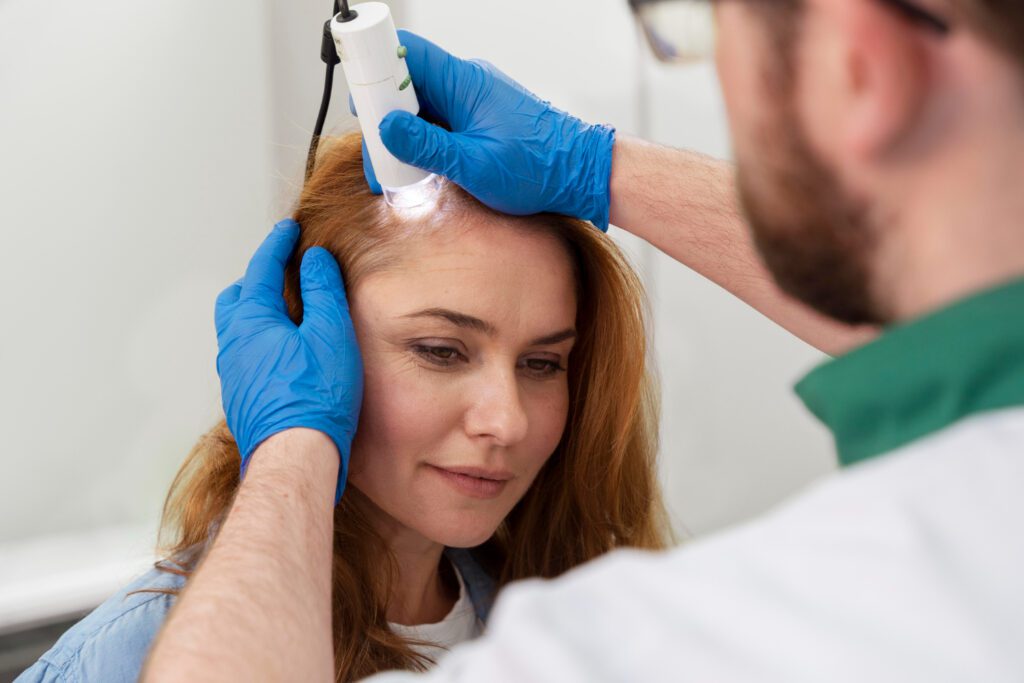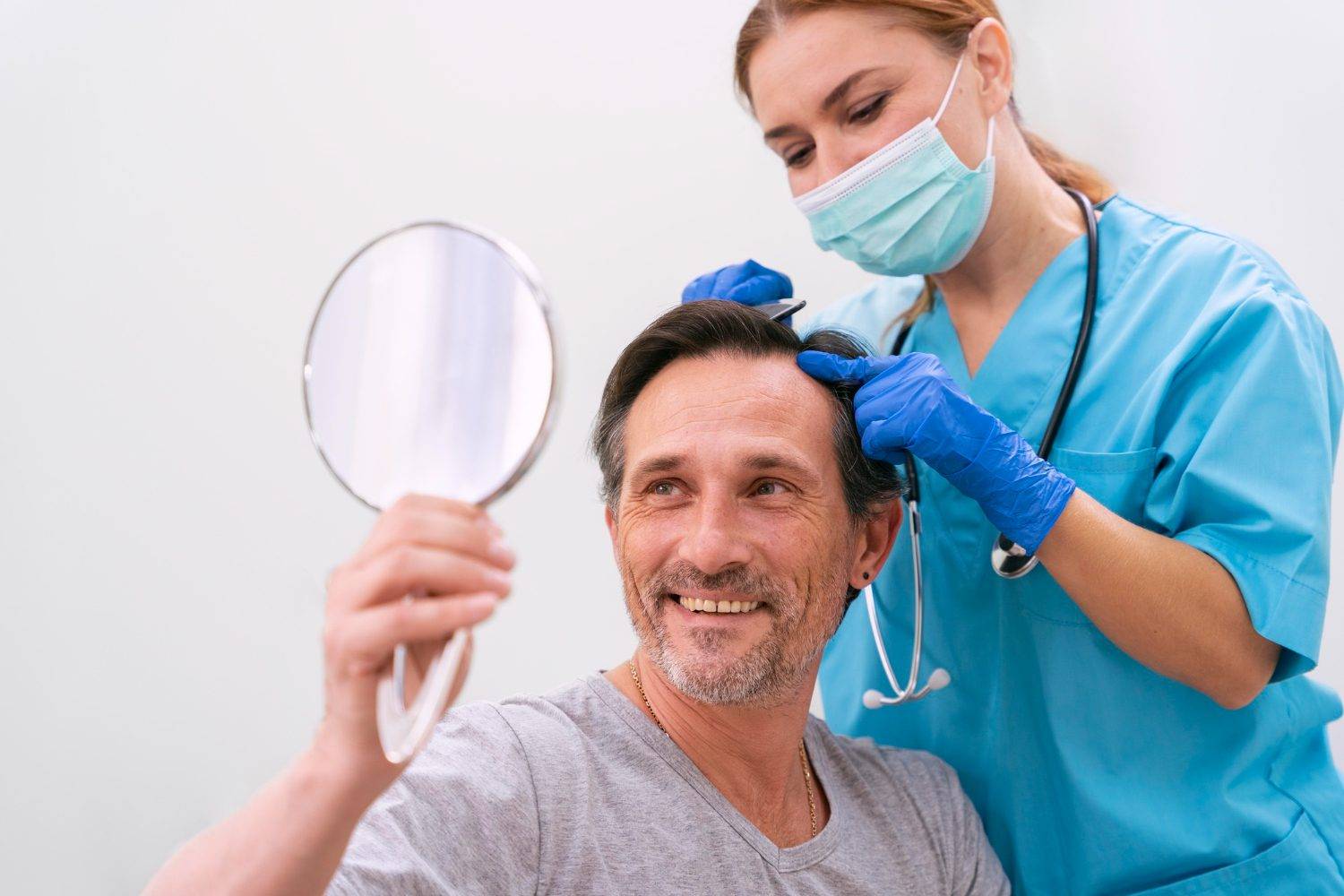Hair Aid Hair Loss Treatment is an effective solution for hair loss, providing reliable results. It is a trusted option for those experiencing hair loss.
Losing hair can be distressing and impact one’s self-confidence. Hair Aid Hair Loss Treatment offers a solution to combat this issue. It is designed to address the underlying causes of hair loss, promoting hair growth and preventing further thinning. Whether the hair loss is due to genetics, hormonal changes, or other factors, Hair Aid Hair Loss Treatment offers a reliable solution.
This treatment is formulated with natural ingredients that nourish the scalp, stimulate hair follicles, and promote new hair growth. With regular use, Hair Aid Hair Loss Treatment can help restore and thicken hair, allowing individuals to regain confidence in their appearance. Say goodbye to hair loss worries and hello to a fuller head of hair with Hair Aid Hair Loss Treatment.
Understanding The Hair Growth Cycle
The hair growth cycle is a fascinating and complex process that involves different phases. By understanding the hair growth cycle, you can better appreciate the remarkable nature of hair and gain insights into how to care for it effectively. In this blog post section, we will delve into the three main phases of the hair growth cycle: Anagen Phase, Catagen Phase, and Telogen Phase.
Anagen Phase
The Anagen Phase is the active growth phase of the hair follicle. During this phase, the hair shaft is produced and pushed up to the surface of the skin. This is the phase where the hair follicle is fully engaged in producing new hair cells. On average, the Anagen Phase lasts for about 2-6 years, but this duration can vary from person to person. Hair on the scalp typically has a longer Anagen Phase compared to hair on other parts of the body.
During this phase, hair grows at a rate of about half an inch per month, and it is important to note that genetics play a significant role in determining the length of the Anagen Phase. External factors such as a healthy diet, proper hair care routine, and stress management can also influence the duration of this phase. By maintaining a healthy lifestyle and prioritizing hair care, you can optimize the Anagen Phase and promote hair growth.
Catagen Phase
After the Anagen Phase, the hair follicle enters a transitional phase known as the Catagen Phase. This is a short and temporary phase that lasts for approximately 1-2 weeks. During this time, the hair follicle stops producing new cells and prepares for the next phase. The hair strand detaches from the blood supply and becomes a club hair, which is simply the hair strand that remains in the follicle without actively growing.
As the Catagen Phase progresses, the hair follicle shrinks and moves closer to the surface of the skin. While the hair is not actively growing during this phase, it is important to note that the follicle is still intact and will resume production in the next phase.
Telogen Phase
The third and final phase of the hair growth cycle is the Telogen Phase, also known as the resting phase. During this phase, the club hair remains in place while new hair begins to form beneath it. This phase can last for approximately 2-3 months, but, similar to the Anagen Phase, the duration varies from person to person.
While in the Telogen Phase, the old hair eventually falls out, making way for the new hair to emerge. It is completely normal to lose a certain amount of hair during this phase, but excessive shedding may be a cause for concern. Factors such as hormonal changes, certain medications, and stress can disrupt the hair growth cycle and lead to prolonged periods in the Telogen Phase.
Understanding the hair growth cycle is crucial when it comes to identifying and addressing hair loss concerns. By knowing what phase your hair is in, you can determine the appropriate hair loss treatment strategies and take proactive steps to maintain a healthy scalp and promote optimal hair growth.

Photo Credit: https://www.freepik.com
Causes Of Hair Loss
Many people experience hair loss at some point in their lives. While it is a common occurrence, it can be distressing for those affected. Hair loss can occur due to a variety of factors, including genetic factors, hormonal imbalances, nutritional deficiencies, medical conditions, and stress and lifestyle factors. Understanding the primary causes of hair loss is crucial in finding effective solutions to combat this issue. In this article, we will explore each of these causes in detail.
Genetic Factors
One of the leading causes of hair loss is genetic factors. Hereditary hair loss, also known as androgenetic alopecia, affects both men and women. In men, it often manifests as a receding hairline or bald patches, while women may experience thinning hair. This type of hair loss is caused by a combination of genes inherited from both parents and the presence of certain hormones.
Hormonal Imbalances
Hormonal imbalances can also contribute to hair loss. Changes in hormone levels, such as those occurring during pregnancy, menopause, or thyroid disorders, can disrupt the hair growth cycle and lead to excessive shedding. Imbalances in hormones like testosterone and estrogen can have a direct impact on hair follicles, resulting in weakened or miniaturized hair strands.
Nutritional Deficiencies
Proper nutrition is essential for maintaining healthy hair. Deficiencies in certain vitamins and minerals can lead to hair loss. For example, a lack of iron, zinc, biotin, and vitamin D can negatively affect hair growth and result in increased shedding. It is important to ensure a balanced diet that includes foods rich in these essential nutrients to support healthy hair.
Medical Conditions
Various medical conditions can cause hair loss. Conditions such as alopecia areata, where the immune system mistakenly attacks the hair follicles, can result in patchy hair loss. Other medical conditions, such as scalp infections, thyroid disorders, and autoimmune diseases, can also contribute to hair loss. Treating the underlying medical condition is crucial in addressing the hair loss issue.
Stress and Lifestyle Factors
High levels of stress and certain lifestyle factors can exacerbate hair loss. Chronic stress can disrupt the hair growth cycle and lead to increased hair shedding. Additionally, practices such as excessive hairstyling, tight hairstyles, and the use of damaging hair products can weaken the hair strands and cause breakage. Adopting healthy stress management techniques and taking care of the hair properly can help prevent further hair loss.
Understanding the causes of hair loss is the first step in finding effective solutions. By addressing the underlying factors contributing to hair loss, individuals can take proactive steps to promote healthy hair growth and prevent further hair loss.
Medication Treatments
Medication treatments play a crucial role in combating hair loss and promoting hair regrowth. There are various options available, ranging from topical treatments to oral medications. Understanding these treatment methods can help individuals make informed decisions regarding their hair health. In this article, we will explore the different medication treatments offered by Hair Aid Hair Loss Treatment.
Topical Treatments
Topical treatments for hair loss involve applying medications directly to the scalp. These treatments are designed to target specific areas where hair thinning or baldness is a concern. Hair Aid Hair Loss Treatment provides a range of effective topical solutions that can help stimulate hair growth and improve overall hair health.
One popular topical treatment offered by Hair Aid Hair Loss Treatment is the Hair Regrowth Serum. This serum contains a powerful blend of ingredients that work together to nourish the hair follicles, promote blood circulation, and strengthen the hair strands. Regular use of this serum can help reduce hair loss and stimulate new hair growth.
Another effective topical solution is the Scalp Revitalizing Spray. This spray is specifically formulated to invigorate the scalp, improve blood circulation, and provide essential nutrients to the hair follicles. The Scalp Revitalizing Spray is easy to use and can be applied directly to the scalp for maximum effectiveness.
Oral Medications
Oral medications for hair loss are ingested orally and work from within to address the underlying causes of hair thinning and baldness. Hair Aid Hair Loss Treatment offers a range of oral medications that are designed to combat hair loss and promote hair regrowth.
One popular oral medication is the Hair Regrowth Capsules. These capsules contain a potent blend of vitamins, minerals, and herbal extracts that are known to support hair health. By taking these capsules regularly, individuals can provide their bodies with the necessary nutrients to promote hair growth and improve hair strength.
In addition to the Hair Regrowth Capsules, Hair Aid Hair Loss Treatment also offers the Hair Nourishing Tablets. These tablets are packed with essential nutrients, including biotin, collagen, and antioxidants, which are known to promote healthy hair growth. By incorporating these tablets into their daily routine, individuals can nourish their hair from the inside out.
It is important to note that while medication treatments can be highly effective in addressing hair loss, results may vary depending on the individual. Consulting with a hair loss specialist at Hair Aid Hair Loss Treatment can help determine the most suitable medication option for each person’s unique needs.
Hair Transplantation

Photo Credit: https://www.freepik.com
When it comes to finding a solution for hair loss, one of the most effective and popular methods is hair transplantation. Hair transplantation involves surgically moving hair follicles from one part of the body, typically the back or sides of the head, to the areas experiencing hair loss. This procedure provides a long-lasting and natural-looking solution for those who are looking to regain their hair and boost their confidence.
FUE (Follicular Unit Extraction)
FUE, or Follicular Unit Extraction, is a modern and advanced technique used in hair transplantation. This method involves extracting individual hair follicles from the donor area using a specialized surgical instrument. The extracted follicles are then carefully implanted into the areas experiencing hair loss.
FUE is a preferred choice for many individuals due to its minimally invasive nature. The procedure leaves no linear scar in the donor area, making it ideal for those who prefer to wear their hair short. Additionally, FUE typically results in faster healing times and less discomfort compared to other transplantation methods.
FUT (Follicular Unit Transplantation)
FUT, or Follicular Unit Transplantation, is another popular technique used in hair transplantation. Also known as the strip method, FUT involves removing a small strip of tissue from the donor area, usually the back of the head. The hair follicles are then extracted from this strip and transplanted into the areas experiencing hair loss.
Although FUT leaves a linear scar in the donor area, it provides the advantage of allowing more hair follicles to be transplanted in a single session compared to FUE. This makes it a suitable option for individuals with extensive hair loss.
Both FUE and FUT are proven and effective methods of hair transplantation, and the choice between the two depends on various factors such as the extent of hair loss, the donor area condition, and individual preferences. Consulting a qualified hair transplant specialist can help determine the most suitable procedure for each individual case.
Essential Oils
When it comes to combating hair loss, essential oils have been gaining popularity for their natural and effective properties. These oils are known to nourish the scalp, stimulate hair growth, and reduce hair fall. In this section, we will explore three key essential oils that have shown promising results in promoting hair health: Rosemary Oil, Peppermint Oil, and Lavender Oil.
Rosemary Oil
Rosemary Oil is a popular essential oil known for its invigorating aroma and numerous benefits for hair and scalp health. It has been used for centuries as a natural remedy for hair loss and thinning hair. This oil is rich in antioxidants that help fight free radicals, which can damage hair follicles and lead to hair loss. By improving blood circulation to the scalp, Rosemary Oil promotes hair growth and prevents premature graying.
Research has shown that Rosemary Oil can also strengthen hair follicles and reduce the occurrence of dandruff and dryness, leaving your hair looking healthy and vibrant. To use Rosemary Oil for hair care, you can dilute a few drops in a carrier oil, such as coconut or almond oil, and massage it into your scalp regularly. This can help stimulate hair growth and improve overall hair health.
Peppermint Oil
Peppermint Oil is another essential oil that has shown promising effects in reducing hair loss and promoting hair growth. The cooling sensation of Peppermint Oil when applied to the scalp helps improve blood circulation, nourishing the hair follicles and promoting healthy hair growth. Its menthol content provides a soothing effect, relieving any itchiness or irritation on the scalp.
In addition to its stimulating properties, Peppermint Oil also has antimicrobial properties that can help combat dandruff and fungal infections on the scalp, which are often underlying causes of hair loss. Research has suggested that Peppermint Oil has the potential to increase the number of hair follicles and promote thicker hair growth.
Lavender Oil
Lavender Oil is well-known for its calming scent, but it also offers various benefits for hair and scalp health. This essential oil is rich in antioxidants and antimicrobial properties, making it an excellent choice for maintaining a healthy scalp. By reducing inflammation and improving blood circulation to the hair follicles, Lavender Oil can promote hair growth and prevent hair loss.
Additionally, Lavender Oil has been found to have a balancing effect on oil production in the scalp, making it beneficial for individuals with oily or greasy hair. It can help regulate sebum production, preventing clogged hair follicles that can lead to hair thinning. Regular use of Lavender Oil can leave your hair feeling refreshed, nourished, and less prone to breakage.
In conclusion, essential oils like Rosemary Oil, Peppermint Oil, and Lavender Oil offer natural and effective solutions for hair loss treatment. Their unique properties can help stimulate hair growth, strengthen hair follicles, and improve overall scalp health. Incorporating these essential oils into your hair care routine may be a valuable addition to your efforts in achieving healthy and luscious hair.
Nutritional Supplements
Nutritional supplements play an essential role in improving hair health and combating hair loss. Incorporating specific vitamins and minerals into your daily routine can contribute to the growth and strengthening of your hair follicles. Among the many hair loss treatments available, Nutritional Supplements offer a natural and effective solution. Here, we discuss three key supplements that have shown promising results in promoting hair growth: Biotin, Saw Palmetto, and Iron.
Biotin
Biotin, also known as Vitamin B7, is a water-soluble vitamin that is crucial for maintaining healthy hair. It plays a significant role in converting food into energy and is essential for the production of keratin, a vital protein that forms the structure of hair strands. Including biotin in your diet or taking a biotin supplement can help improve the strength and thickness of your hair, reducing hair breakage and promoting hair growth.
Saw Palmetto
Saw Palmetto is an herbal extract that has gained popularity for its potential in combating hair loss. It is derived from the fruit of the Saw Palmetto palm, and its active compounds may help inhibit the enzyme responsible for converting testosterone to dihydrotestosterone (DHT). DHT is known to contribute to hair follicle shrinkage and miniaturization, ultimately leading to hair loss. By blocking the conversion of testosterone to DHT, Saw Palmetto may help preserve hair follicles and promote hair regrowth.
Iron
Iron deficiency is a common cause of hair loss, especially in women. Iron is vital for the production of red blood cells, which supply oxygen to the hair follicles and promote their growth. Low iron levels can disrupt the hair growth cycle, leading to hair thinning and shedding. Including iron-rich foods in your diet or taking iron supplements can help prevent iron deficiency and promote healthy hair growth.
Incorporating these nutritional supplements into your daily routine can assist in improving the health and appearance of your hair. However, it’s important to consult with a healthcare professional before starting any new supplements or making significant changes to your diet. Additionally, these supplements work best when combined with a healthy lifestyle, including a balanced diet, regular exercise, and proper hair care practices. By taking a holistic approach to hair care, you can optimize your chances of achieving thick, healthy locks.
Frequently Asked Questions :
What’S The Best Hair Treatment For Hair Loss?
The best hair treatment for hair loss is different for each person. Consult with a professional to determine the most suitable option for you.
Can Hair Grow Back After Thinning?
Yes, hair can grow back after thinning.
Which Vitamin Deficiency Causes Hair Loss?
Vitamin deficiency that causes hair loss is mainly due to a lack of vitamin D or biotin.
How Can I Regrow My Hair In 3 Weeks Naturally?
Regrowing hair naturally in 3 weeks can be achieved through proper diet, scalp massage, and using essential oils.
Conclusion
Hair Aid Hair Loss Treatment offers a natural and effective solution for those struggling with hair loss. The unique blend of ingredients in this treatment helps to promote hair growth, strengthen the hair follicles, and reduce hair breakage. Clinical studies have shown promising results, with participants seeing significant improvement in hair density and thickness.
Not only does Hair Aid address the root cause of hair loss, but it also nourishes the scalp, providing the optimal environment for healthy hair growth. With its easy-to-use application and fast-acting formula, Hair Aid is a convenient solution for anyone seeking to regain their confidence and restore their hair’s natural beauty.
Say goodbye to thinning hair and hello to a fuller, healthier mane with Hair Aid Hair Loss Treatment. Don’t miss out on the opportunity to transform your hair and boost your self-esteem. Try Hair Aid today and experience the difference for yourself.

